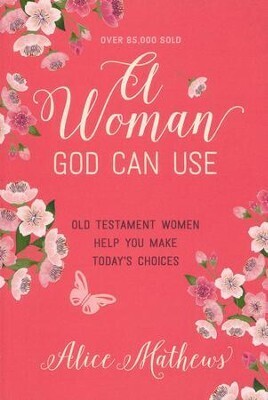Ruth: The Ezer Daughter-in-Law
Article / Produced by TOW Project
Women's work takes many forms. Among the women in the Old Testament, some served as midwives, some as either prostitutes or innkeepers, some as prophets, and one as the leader of the nation. But for many women today, as in biblical times, work is primarily within the home. In the sphere of domestic life women make choices every day about how they will carry out their necessary work. Sometimes those choices seem easy; other times they require a strong commitment to go beyond what anyone would normally expect. That was true of a Moabite woman named Ruth.
The back-story: In the Israeli town of Bethlehem a man named Elimelech inherited land, which he planned to pass on to his sons Mahlon and Kilion. (In the Ancient Near East, property nearly always passed from father to son, never to daughters - with one exception.) Life was good for this family until a famine in Bethlehem sent them fleeing to the neighbor nation, Moab, where food was plentiful. There the two sons married Moabite women. In time the father and both sons died, leaving three widows: Naomi (Elimelech's wife), Ruth, and Orpah. In that culture, Ruth and Orpah were expected to return to their father's house where arrangements for another marriage would be made. This was necessary because a woman could not survive without a man (father, husband, or son) to take care of her.
When Naomi decided to return home to Bethlehem, she urged her two daughters-in-law to return to their fathers’ homes and seek other husbands. Orpah agreed to do so, but Ruth resisted. Instead, she insisted to Naomi: "Do not press me to leave you or to turn back from following you! Where you go, I will go; where you lodge, I will lodge; your people shall be my people, and your God my God" (Ruth 1:16). These are the words of an ezer woman. She had many reasons to follow Orpah's example, but she steadfastly insisted that she would go with Naomi. Israelis hated Moabites, and if she went to Bethlehem she would face prejudice as an immigrant. But Ruth knew that Naomi had no one else to care for her. So together Naomi and Ruth journeyed to an unknown future in Bethlehem.
Upon arrival, Ruth's first concern was to find food for the two of them. The barley harvest was in full swing, and Ruth became a "gleaner." Outsider or not, her work was cut out for her. Gleaning meant crawling on hands and knees down rows of grain, retrieving any kernels that the harvesters had missed. When the owner of the field (a man named Boaz) saw Ruth’s commitment and heard her story, he determined to add to her pickings. When Naomi heard about the Boaz’s generosity, she developed a daring plan: Ruth, a penniless immigrant, would eventually propose marriage to the rich Israelite owner of a barley plantation!
The little book of Ruth in the Old Testament can be read through in less than an hour. If you read it, you know that Naomi’s scheme succeeded. When Ruth asked Boaz to "spread your cloak over me, for you are next-of-kin" (Ruth 3:9), he knew a marriage proposal when he heard one. His response: "May you be blessed by the Lord, my daughter; this last instance of your loyalty is better than the first; you have not gone after young men, whether poor or rich. And now, do not be afraid. I will do for you all that you ask, for all the assembly of my people know that you are a worthy woman."
The Hebrew word (chayil), here translated “worthy,” really has a much stronger meaning in the Bible. It's a common word, appearing 246 times in the Old Testament. In all but a very few cases it refers to soldiers or armies and is usually translated as “strength” or “valor.” A soldier who refuses to desert his post in the face of danger is a chayil soldier. This is the kind of strength that Ruth brought to her care for Naomi.
There was, however, a hitch before a wedding could take place: a nearer relative wanted Elimelech's land, and Boaz knew that the other man had the prior claim. But when that fellow found out that Ruth would go with the bargain, he backed out because of complicated inheritance laws which meant a son of his through Ruth could inherit the land for Naomi’s family, rather than for Elimelech’s. After a public arbitration session Boaz was free to marry Ruth. They did have a son, and that son did become Naomi's heir.
We may smile at these ancient customs, but they point to Ruth's integrity on the job. Her ethnic identity had become secondary to her faith in Naomi's God, which in turn spotlighted her loyalty to her mother-in-law and her willingness to work hard to support them both.
If you read the little book of Ruth to the end, you know that Ruth and Boaz became the great-grandparents of Israel's greatest king, David. The ezer outsider was now part of God's people in Bethlehem, and like Rahab, this outsider woman also became an ancestor of Jesus Christ (Matthew 1:3). Who could have guessed such an amazing outcome!
In today's work world, ezer women are sometimes called to cross ethnic barriers in order to do good for the community. That is never easy, but if God is honored, it can lead to unexpected blessing for the woman herself as well as for others touched by ethnic insensitivity.






